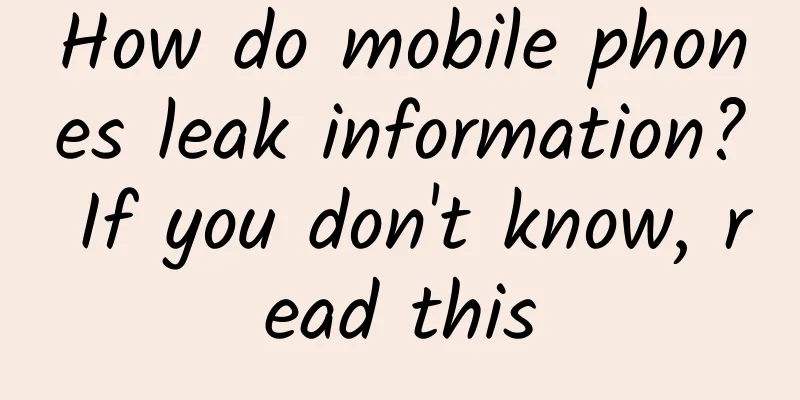How do mobile phones leak information? If you don't know, read this

|
At present, mobile phones have become one of the necessities of modern life. The privacy of mobile phones makes the information on users' mobile phones closely related to their own interests. Once a mobile phone is attacked by malware or viruses, it will hinder the owner's use, easily leak personal privacy, damage the user's economic interests, and even endanger national security. How to prevent peeping and leakage of mobile phones is receiving more and more attention. Mobile phones can leak personal privacy in a variety of ways. According to statistics, there are 1.293 billion mobile phone users in my country, and many people own more than two mobile phones. Every year, about 100 million mobile phones are eliminated and discarded nationwide. Among Internet users, the proportion of users who access the Internet through mobile phones is close to 80%, exceeding desktop computers. Mobile phones have become the number one Internet terminal for Chinese Internet users.
At the same time, the number of mobile phones attacked by malware in my country has continued to rise in recent years, and privacy leaks have become commonplace. This information mainly includes four categories: personal location information, communication information, account password information, and storage file information. Cell phones - how they reveal our information 1. The application itself is not perfect The most prominent of these is the Android system. Relevant research shows that the Android system has become the main target of malware infection, nearly 60% of Android applications in the domestic market have problems, and about a quarter of Android users' privacy has been threatened by leakage. Some experts said that the main reason is that Android is open source, and software users have the right to freely use and access the source code, and can modify, copy and redistribute the software and directly exchange information. Some users will also crack the system and obtain permissions. These are the main reasons for the leakage of personal information on the Android platform. Some knockoff mobile phones even have backdoor programs, fixed eavesdropping software, and remotely control the phone microphone to turn on without the user's knowledge, turning the phone into an eavesdropping device, causing personal privacy leakage. 2. Inadequate software supervision. At present, the domestic Android market has different ways for users to obtain software, and it is inevitable that there are good and bad ones. Android software secondary developers themselves are also quite chaotic. In addition, the software online review and supervision are not strict, and developers will intentionally or unintentionally abuse permissions and add certain functions to the software to obtain user information, causing leaks. For example, a game APP actually wants to access the user's address book and call records, and even geographic location information, which are not permissions required by the software, which puts a large number of users' privacy at risk of leakage. 3. Failure to properly dispose of old mobile phones. When disposing of old mobile phones, many users do not completely delete the relevant information, or simply delete or format them. Whether these old mobile phones are passed on to friends and relatives, or resold to the second-hand market, the deleted information can be restored through data recovery tools, which makes the personal information on the old mobile phones vulnerable to leakage. At present, criminals and hostile intelligence agencies have extended their tentacles to the second-hand mobile phone trading market, and using data recovery technology to collect and organize intelligence information has become a new way for criminals to illegally obtain information. In addition, if the mobile phone is accidentally lost or stolen, the sensitive information stored in it is more likely to be leaked. 4. Intercept information by listening to positioning devices. At present, various interception devices for mobile phone communications are emerging in an endless stream, and their performance is constantly improving. Especially when using WIFI, since personal information needs to pass through the transmission route during the Internet transmission process, if the routing device is controlled by someone, personal privacy will naturally be leaked. As long as the intercepted mobile phone signals are processed by the corresponding technology, the listening equipment can easily obtain the voice and data information of the mobile phone signals. For example, the "Echelon System" developed by the United States can eavesdrop on 95% of various radio signals in the world. Obviously, in addition to personal privacy, if the state secrets such as major decisions on state affairs and the activities of the armed forces are mastered by the enemy, it will seriously endanger my country's national security. In addition, while the positioning function of mobile phones provides users with high-precision location services, it also makes the mobile phone a locator, exposing the user's own location information. The US military successfully killed Abu Zubaydah, the second-in-command of al-Qaeda, making full use of the positioning technology of mobile phones. 5. Hackers break in and steal secrets. When using mobile value-added services, a mobile phone actually becomes a terminal connected to the Internet. Viruses, malware, and rogue software compiled by hackers can illegally start the mobile phone, connect to the Internet privately, send text messages privately, and maliciously deduct fees. They can also spy on and steal text messages, address books, personal emails, as well as photos, private files, account numbers, password information, etc. in the mobile phone, and can also monitor the content of calls. After the call is completed, the Trojan program will start the upload program and upload the call recording to the server set up by the criminals, exposing the user's privacy. In this way, the user's personal information will be at the mercy of others without the user's knowledge. There are three main ways for hackers to implant spyware into the phone of the person being eavesdropped: First, the Trojan horse generates text messages or multimedia messages and uses attractive titles to trick users into clicking or running them. Or the malicious code is hidden in a "blank text message". Once the user opens the text message, the mobile phone system background will automatically download the malware and implant the stealing software into the phone. Second, it is disguised as commonly used mobile phone applications, such as games, security patches, free materials, and e-books, and uploaded to some small and medium-sized mobile phone software forums that lack security verification to trick users into downloading and installing, or it is transmitted to the person being eavesdropped through Bluetooth, infrared, etc., to trick the other party into installing it. Third, the malware is installed in a borrowed mobile phone, or the eavesdropping software is implanted in a new mobile phone and given to the person being eavesdropped as a gift. In addition, most of the mobile phone technology systems currently used in my country originate from foreign countries, and the encryption system is controlled by others, which is also an important reason why mobile phones have security risks when used. Mobile phones - you can choose any method to prevent leaks Information security is no small matter. Once the privacy and secrets of individuals, units, and countries are leaked, they often cause many adverse effects on society. Various information leakage incidents reflect the lack of awareness of personal information security and the lack of industry standards, which also make us more aware of the importance of mobile phone information security to the national economy and people's livelihood. Ordinary users are not powerless to prevent mobile phone information leakage. As long as they enhance their awareness of information security and confidentiality, master the common sense and skills of mobile phone security protection, and learn to use mobile phones scientifically, it is entirely possible to reduce or even eliminate personal information leakage. 1. We must put an end to the mentality of paralysis and luck Nowadays, many people only know how to use mobile phones, but they lack understanding or know little about the destruction of mobile phone memory card information data, mobile phone information security risks and technical loopholes. Therefore, we must put an end to the paralysis of thought and fluke mentality, strengthen learning, and truly recognize the various security risks in the use of mobile phones, recognize the ways and means of mobile phones leaking personal information, fully realize the serious consequences of mobile phone leaks, and keep the alarm bell ringing to prevent mobile phone leaks. 2. Master safety precautions Special mobile phone management methods should be used for special groups of people, special places, and special content. For personnel involved in secrets, such as soldiers and confidential personnel, a strict mobile phone management and use system should be formulated, or special mobile phones with strong confidentiality should be distributed to ensure that special phones are used for special purposes. For places involving secrets, mobile phone security equipment should be installed in accordance with confidentiality regulations. Do not carry or use mobile phones in places involving secrets, and do not use mobile phones to record, record, take photos, or transmit secret content. At the same time, do not easily answer or receive calls, text messages, multimedia messages, or emails from strangers. Turn off your phone when necessary and completely cut off the power supply to prevent viruses or Trojans from being implanted. Do not set your phone to log in automatically. Enter your password every time you log in. Make full use of the pattern and password lock screen function that comes with your phone to prevent others from unlocking the screen and peeking at your personal privacy. Smartphone users should log out of their mobile phone account in a timely manner after using network services. They should also regularly and promptly delete possible sensitive information. 3. Strictly abide by all confidentiality regulations Various confidentiality regulations not only play an inestimable role in protecting corporate data, trade secrets and even national security, but also help protect personal privacy. To this end, it is necessary to strictly abide by various confidentiality regulations, especially not to store or process important confidential information on mobile phones, and prevent the occurrence of leaks from the source. It is necessary to avoid leaking relevant important information in communications, WeChat, QQ, and emails. Do not store sensitive information such as the work unit and position of core personnel on mobile phones. You can also use abbreviations or code names to avoid the complete exposure of important sensitive information. 4. Use a formal platform to download software When smartphone users download software, they should log in to the official platform to download and avoid downloading from forums. Do not use software from unknown sources and do not browse bad websites. Insist on having your phone repaired and maintained by a regular mobile phone operator to prevent virus programs from being implanted. When installing software, be sure to check the list of permissions requested by the software in detail, and be especially vigilant when sensitive permissions appear. If the software requires providing contacts, text messages, etc. that are not related to the service, or if you install a reader program but require camera access permissions, be wary of traps. 5. Strictly control system permissions Mobile phone users should be aware of the risks and try to avoid granting suspicious programs both the permission to access personal privacy and the permission to access the network. For functions that are not usually used or rarely used, such as Bluetooth, infrared, mobile phone positioning, high-definition camera, etc., they should be turned off or stopped to prevent the mobile phone from being remotely attacked or searched by viruses. These functions should be turned on only when they are needed. When using free WIFI, only use the network that you know and trust, and do not easily send out important personal information. 6. Completely delete unnecessary information When users delete or format information in the mobile phone storage medium, the information is not actually cleared, but only the master boot area information is deleted, its control structure is modified, and it is marked as overwriteable. When new information is stored, the original information can be overwritten, but when it is not overwritten, as long as it is not physically damaged, the information is still retained in the storage medium and can be recovered. Therefore, when changing a mobile phone or needing to delete relevant information, you can choose mobile phone software with data shredding function, or format the mobile phone and repeatedly store a large amount of useless data such as movie videos, junk files, pictures, etc. in the mobile phone memory, and then repeatedly delete this information, so that invalid information repeatedly fills up the mobile phone space, completely overwriting the original information, and increasing the difficulty of data recovery. In addition, try not to transfer or sell old mobile phones at will, and they should be physically destroyed to avoid the risk of exposing privacy. In addition, you can also use multiple mobile phones, physically separate the phones used for work and personal communication from the phones used for Internet access and entertainment, try to store information such as contacts and text messages on the SIM card, and store photos, pictures and other files on external storage outside the phone to reduce the risk of information leakage. |
<<: Comparison of the five major smartphone systems to see which one is stronger
>>: How to get "Apple Recommended" for a good game? There is a routine
Recommend
Analyze three classic theories to extract inspiration and skills for advertising creativity
The importance of creativity in advertising has b...
How much does it cost to make a housekeeping and cleaning mini program?
With the continuous aging of the population, many...
Where is Cordyceps sinensis produced? Which province is Cordyceps sinensis mainly produced in?
We all find the growth of Cordyceps very magical....
I almost lost my toes while riding the escalator! Crocs lovers, beware!
Summer is here, and Crocs are back. Although they...
Shock? Panic? Has the Big Bang theory been overturned by the Webb telescope?
Recently, a friend forwarded me an online article...
Scientists have given the newly discovered pangolin a temporary name of "mysterious", and you may never guess why...
Not long ago, the team led by Professor Yu Li fro...
I accidentally ate this fruit and my mouth swelled up like a sausage!
Review expert: Shi Jun, Ph.D. in botany, well-kno...
Why is there a fine for adding acesulfame potassium, a common beverage, into orange juice?
Recently, another piece of news related to food a...
[Must-Read for Internet People] After a few years in the industry, where should your future be?
Anyone who has been in this industry for three to...
The most "perverted" food hoarding: They turned cockroaches into living food reserves
We have all heard this fable: in the summer, ants...
Activity operation sandbox/activation engine
We have talked about so many recommendation algor...
Is it expensive to join the Hami Underwear Mini Program? List of franchise fees for Hami Underwear Mini Program
For entrepreneurs, although mini program developm...
China Automobile Dealers Association: Automobile consumption fell by 2% in 2020, and new energy vehicle production increased by 17% to 1.46 million
According to the data from the National Bureau of...
ThunderTron ST-R1 laptop review: A small screen can also have high-end features, with a small but powerful aesthetic!
In the current gaming laptop market, many manufac...
Should blood pressure be measured on the left or right hand? Why might blood pressure in both arms be different?
Measuring blood pressure is a very important part...









